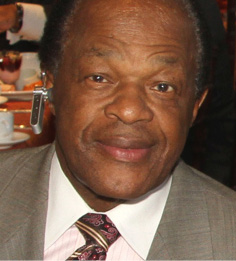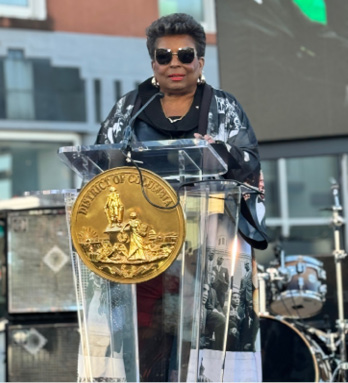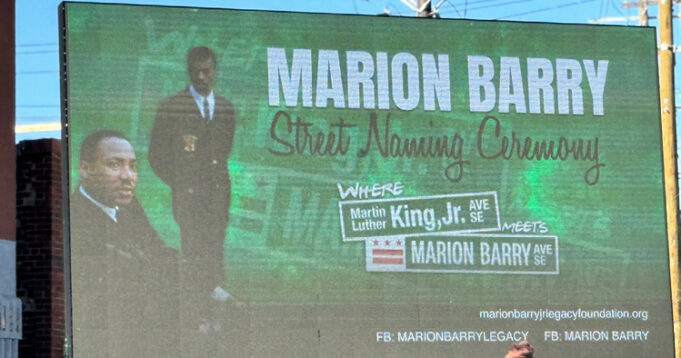WASHINGTON, D.C.—Marion Barry, affectionately known as D.C.’s “Mayor for Life,” will have his name repeated daily as the former Good Hope Road was renamed during a November 18 community festival to Marion Barry Avenue. It intersects with Martin Luther King Avenue in Ward 8 where Mr. Barry, a four-term mayor and councilman served for decades. He died in 2014.
It was standing room only where hundreds gathered to see the unveiling of the new street sign. The project took years to complete, but the community activists were committed to getting it done. They gathered thousands of signatures on a petition in all kinds of weather. Ward 8 Councilman Trayon White introduced legislation to rename the street.

When the big reveal arrived, the community festival featured speakers including Marion Barry’s wife, Cora Masters Barry, Councilman White, Congresswoman Eleanor Holmes Norton (D-D.C.), National Urban League President and CEO Marc Morial and D.C. Mayor Muriel E. Bowser. The crowd watched videos of Mr. Barry’s career and special remarks from the Rev. Jesse Jackson.
Go-Go music and D.C.’s homegrown flair filled the air with folks dancing and singing. It was a reunion of sorts that brought back people who knew Marion Barry, people who thanked him for their first summer jobs and others who told funny stories of how he impacted their lives.
“He would be the first to tell you that he was the champion for the last, the lost and the least. But he would also tell you that he transformed every ward of Washington, D.C.,” Mayor Bowser said from the podium. “Marion Barry challenges us to do more, to be bigger, to get up when we’ve been knocked down and to show the world who we are as Washingtonians and who we are as people.”
The street name is the latest honor for the man whose legacy continues to thrive. There is a statue of him on historic Pennsylvania Avenue and an office building at One Judiciary Square named the Marion S. Barry Jr. Building. The summer youth employment program he supported is called the Marion Barry Summer Youth Employment Program.
Many people outside of D.C. wonder why the city is so enthralled with a man who, while mayor, was set up in a drug sting. He was arrested and sentenced to six months in prison for possession of crack cocaine. When he was released, he returned to city politics and was elected to the city council before once again winning the mayoral election in 1994 for an unprecedented fourth term.
Marion Barry became a target of media criticism and rebuke. He was called a drug dealer and some of the worst names that could be given to a Black political leader. He withstood it all and focused on serving the people.
During a 2022 wreath-laying ceremony at the monument of Mayor Barry, the Honorable Minister Louis Farrakhan of the Nation of Islam reminded the audience that, “Mayor Barry, born in Mississippi, raised in Memphis, Tennessee, was a child of God from the very beginning. Satan had his way with him for a while, but Mayor Barry was always to be a servant of God and a servant of his people.

And Jesus said, ‘Whoever would be great among you, let him be your servant,’ for he didn’t come into the world to be served, he came into the world to serve.”
The Minister added, “What Mayor Barry did, he showed every mayor how to serve as a mayor! He used the levers and the power of government to serve ‘the little man’; he opened up the door for people who would not even be considered to get a contract with their government.”
Former first lady Cora Masters Barry also spoke about why after all these years, people still love and admire her husband: “If people ask me, ‘Why do people love him so much?’” Her answer: “It’s because he loved them so much.” That love for the people was demonstrated in everything Marion Barry did, she said.
In 1967, with financial support from the U.S. Department of Labor, Mr. Barry started Pride Inc., an organization that employed young men from the district’s most impoverished neighborhoods. Many credit him with directing 45 percent of government contracts to minority-owned businesses and launching multiple initiatives that uplifted communities that were often overlooked and left out. During his tenure, many thanked him for helping to create D.C.’s thriving Black middle class.

Mayor Barry wanted to have a connection with his residents. He worked a day on a city trash truck to better understand their experiences. He created the city’s first TV station and instituted the city government’s first internet site, which was one of the first for a major city government.
His reelection as mayor in 1994 put him in a prime position to help Minister Farrakhan with the historic 1995 Million Man March. Claudette Marie Muhammad was the national deputy director for the March and worked directly with the mayor. She told The Final Call, “He had a love for the people, all people, not just Black people. He was a servant to humanity and he loved the Honorable Minister Louis Farrakhan. When Marion first ran for election, he called me and asked me if I would work in his campaign. I did.”
The Million Man March became a city effort with personnel and resources.
“Mayor Barry did for D.C. what no one else could or would have done,” National of Islam Mid-Atlantic Region Student Minister Abdul Khadir Muhammad told The Final Call. “He was like a gear, a turning that allowed Minister Farrakhan full access to the city’s resources. This sparked the surrounding areas who also gave their support to the March,” he said.

“Marion Barry began to spin the wheels to help make the Million Man March a success,” he continued. “He made a lot of this accessible that again I don’t think any other mayor would have done. We miss him.”
Marion Barry was born in Itta Bena, Mississippi, and graduated from what was then called LeMoyne (now LeMoyne-Owen College) College in 1958. He received a master’s degree in chemistry from Fisk University and was in the middle of a doctoral program in chemistry when he was called to serve. He became the first chair of the Student Non-Violent Coordinating Committee and moved to D.C., in 1965 to run the SNCC office there.
“I’ve loved Mayor Barry since he helped my dad get a job when no one else would hire him,” Rolanda Jackson told The Final Call. “My whole family loves him. I taught my children to love him. He was the best mayor. He came from Ward 8, the poorest ward in the city, but we are rich in culture and more due to Mayor Barry.”
“I’m so happy for this street name change,” she said. “It’s a good thing to walk up and down Marion Barry Avenue.”
—Nisa Islam Muhammad, Staff Writer













